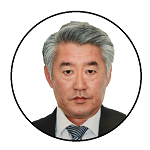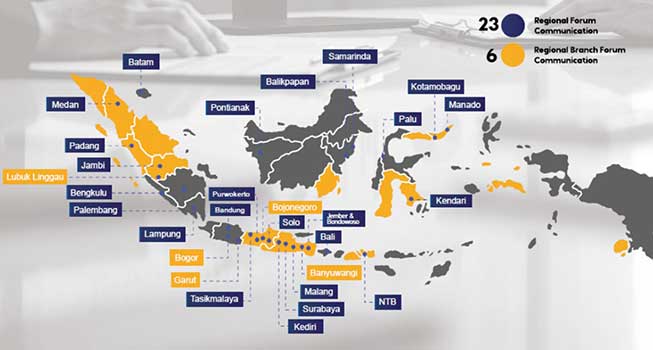Vision and Mission
Vision
- To unite, promote and provide services to its members with the purpose of developing/improving the quality of financial services business pursuant to its capacity and the prevailing regulation in Indonesia.
- To promote cooperation, exchange of information and nurture good understanding among members of the association as well as to maintain good cooperation with government and with other third party creating a sound and harmonized relationships.
- To develop and and improve the role of Financial Services Companies being one of the Financial alternatives in Indonesia as well as giving contribution for the development of national economy.
- To give opinion or suggestion to the government in order to establish a sound and competitive business climate for the financial services industry in Indonesia and to uphold the welfare and common interest of its members.
- To represent the financial service companies in Indonesia in effort to protect their interest in the discussions relating to the development of financial services industry both domestically and abroad.
Mision
- To create the Indonesia Financial Services Association as the main institution for the exchanging the ideas and information, and for accommodating, researching and processing the material and issues related to the Financial Companies business in the broadest sense of words.
- To accommodate and seek solution for the problems encountered by the members and if necessary to give opinion to the government institutions, either central or local province, and/or other relevant authorities.
- To furnish information, to give advice, to provide education, training and guidance as well assistance to the members in order to improve the capability and competency of their human resources so as their need on professional manpower can be fulfilled.
- To form committees as might be deemed necessary, either at central or local province, in order to support the activity of the association.
- To enter into cooperation and to maintain good relation with the instituti on/agency/bureau of the government or private sector, either in the country or abroad, as long as it is not in contravention with the purposes and objectives the association and the prevailing laws and regulation.
- To engage in any other business activities as long as it is notin contravention with the purposes and objectives of the association.
Background
History
The existence of finance industry (multi finance) in Indonesia is actually not too long ago, especially when compared with developed countries. From several sources, it is known that this industry began to grow in Indonesia in 1974. Its birth is based on a Joint Ministrial Decree (SKB) of three Ministers; Minister of Finance, Minister of Industry, and Minister of Trade.
A year after the issuance of the joint decree, PT Pembangunan Armada Niaga Nasional was established in 1975. Then, the Company changed its name to PT (Persero) PANN Multi Finance. Then through the Presidential Decree (Keppres) no. 61/1988, which was further followed up by Minister of Finance Decree no. 1251 / KMK 013/1988, the Government opens wider opportunities for the finance business, with activity coverage including leasing, factoring, consumer financing, venture capital and credit cards.
Being a similar industry, the development of leasing industry is relatively slower compared to the banking industry. Especially when compared to the banking era of post 1988 Deregulation Package where banks emerged and mushroomed. The Government's banking deregulation has produced large numbers of banks, although in a small scale. But many people pointed this 88 Deregulation Package being the source of furture gloomy banking period. The peak, occurred in 1996 when the government liquidated 16 banks followed by the entry of several other banks in the care of the Indonesian Bank Restructuring Agency (IBRA).
However, finance companies are also capable of developing quite impressively. Until now, leasing in Indonesia has participated in the company's financing. The type of goods financed continues to increase. If previously it is focused solely on transportation, it now includes offices, manufacturing, construction and agriculture. This indicates that multifinance is increasingly recognized by national business players.
There are some interesting things if we look at the concentration and development of leasing companies. In the era of 1989, for example, this industry in Indonesia tends to increase its assets. The hunt for such assets is caused by economic challenges because they make them appear bigger, healthier and stronger. Companies that stayed in the original scale were in trouble and eventually closed altogether.
With a large asset and business scale, corporate perceptions are more reliable than others. For those whose capacity is limited, they try to keep appearing majestic and handsome. Then, start lyrics and mutual exploration. The next scenario, many leasing companies are joined in one group. This step seems to have a positive result. In addition to capital and bubbled assets, credibility and market control are also boosted.
But the puffing spirit of asset gradually faded. In the following year (1990), the leasing industry began to return to its basic economic principles. They prefer as much profit as possible. Actually, this orientation change is triggered by the increasingly tight competition in the leasing industry. As a result, prudence is somewhat neglected. The indication, the requirement to get the lease becomes more loose. In fact, reportedly in Bengkulu, one can get a lease just by submitting an ID Card (KTP).
In 1991, there was once again a major change in the finance company. Along with the tight money policy (TMP = Tight Money Policy), better known as Sumarlin I and II Breakthrough - interest rates also skyrocketed. As a result, many already approved credits must be postponed.
In terms of capital, TMP resulted multi-finance companies ran out of blood. The flow of funds that should be folded if any, the price is very high. That is why many of them combine their efforts by joining, they are easier to get credit, including from abroad.
Asosiasi Leasing Indonesia (ALI)
On July 2nd, 1982, the leasing companies in Indonesia formed their own organization named Indonesian Leasing Association (ALI) with its domicile in Jakarta.
This association served as the sole communication forum among the leasing companies in Indonesia. In this forum they together talk about and solve various problems encountered. ALI is also present to fight for the interests of its members to the government on the one hand and on the other hand, this organization also intends to be a bridge to forward the wishes and guidance of the government to its members.
A series of ideal targets became the goal of the establishment of ALI. Among them to promote and develop the role of financing institutions in Indonesia and contribute to the national economy.
ALI to APPI
The presence of ALI has been benefited all leasing business players in Indonesia and ALI has successfully conducted various activities for the benefit of its members, including assisting the development of leasing industry in Indonesia together with the Government.
Along with the growth of the financial services business sector and to accommodate the aspirations of all its members, on July 20th, 2000 a decision was made to change the name of the association from ALI to Indonesian Financial Services Association (IFSA) has been adopted.
In its development, on December 21st, 2000 the Indonesian Factoring Association (AFI) has also merged into IFSA.
The above mentioned decision was in line with the members business existence that financial services companies are allowed to undertake the business activities of leasing, factoring, consumer financing and credit cards.
In accordance with the purpose of its establishment, APPI together with the government continues to give contribution and more meaningful role in the improvement of the national economy, especially in the financial services business sector.
Logo Of The Association
- The Indonesian Financial Services Association Association Symbol consists of a composition with four letters A, P, P, and I. A means Association, P (First) means Company, P (Second) means Financing and I means Indonesia.
- The gradation of orange symbolizes all members of APPI ready to step in to support the finance industry to be a creative industry, innovative and never give up in the digitalization era.
- The gradation blue symbolizes APPI dedication to carry out the mandate of the trust that has been given by its members to represent the finance industry and mobilize the financing industry togetherness.
- The letter A curves illustrates the meaning of the symbol of the arrow and the boat screen which symbolizes the APPI ready to enter a fluctuating digital era with endless innovation and creativity.
APPI Logo Concepts & Meanings
Details of Symbol Composition
2022 - 2027 Management
Supervisory Board

Head of Supervisory Board
Wiwie Kurnia
President Commissioner, Mega Auto Finance

Member of Supervisory Board
Roni Haslim

Member of Supervisory Board
Gusti Wira Susanto
President Commissioner, Moladin Finance Indonesia
Executive Committee

Chairman
Suwandi Wiratno
President Director, Chandra Sakti Utama Leasing

Secretary General
Sigit Sembodo
Managing Director, Bussan Auto Finance

Treasurer,
concurrently serving as Head of Accounting and Taxation Division
Rosalina Dhanudimuljo
President Director, Sinarmas Multifinance
Head of

Compliance, Risk Management, and Sharia Financing
Dewa Made Susila
President Director, Adira Dinamika Multi Finance

Government Relationship I
Agus Prayitno Wirawan
President Director, Toyota Astra Financial Services

Government Relationship II
Ristiawan Suherman
President Director, CIMB Niaga Finance

Industrial Development
Harjanto Tjitohardjojo
President Director, Clipan Finance Indonesia

Legal and Education
Iwan Setiawan
President Director, Mega Finance

Joint Venture Company
Ikuo Sugiyama
President Director, Hexa Finance Indonesia

Financial Services Industry Relations & FKD Development
Primartono Gunawan
Director, BRI Multifinance Indonesia

Sustainable Finance and the Digital Financial Industry
William Francis Indra
Director, Mandiri Tunas Finance
Experts Council

Head as well as Member of Ethics Committee
Susilo Sudjono
Independent Commissioner, Astra Multi Finance

Member of Expert Council
Dennis Firmansjah
President Commissioner, Aditama Finance

Member of Expert Council
Yap Tjay Hing
President Director, KB Finansia Multi Finance
Ethics Committee 2025-2027
| Bambang W. Budiawan, Head as well as Member of Ethics Committee | |
| Dennis Firmansjah, Member | |
| Murgiyanto, Member |
APPI Committee 2022-2027
4-Wheel Field Committee
| Ronny, Oto Multiartha | |
| Harry Latif, Adira Dinamika Multi Finance | |
| Devy Santoso Jayadi, Toyota Astra Financial Services | |
| Raden Ari Priyadi, PT KB Bukopin Finance | |
| Usman, Astra Sedaya Finance | |
| Jusuf Setiawan, Dipo Star Finance |
2-Wheel Field Committee
| Victoria Rusna, Summit Oto Finance | |
| Alung Ng, Bussan Auto Finance | |
| Andy Sutanto, Adira Dinamika Multi Finance | |
| Ronald Bintoro, Federal International Finance | |
| Donny Ardianto Pribadi, Mandiri Utama Finance |
Heavy Equipment Committee
| Hasin Soleh, Chandra Sakti Utama Leasing | |
| Denny, Clipan Finance Indonesia | |
| Jembar Ganda Ermaya, Liugong Finance Indonesia |
Electronic and Fund Financing Committee
| Didiet Hardiyanto, Astra Multi Finance |
Legal & Consumer Protection Committee
| Ingrid Setiadharma, Adira Dinamika Multi Finance | |
| Daniel Constantyn Adam, Dancons & Associates | |
| Lora Oktaviani, Bussan Auto Finance | |
| Epivania Caroline Galag, Home Credit Indonesia | |
| Antonius Adhitama, KB Finansia Multifinance | |
| Denny Tirtakusumah, CIMB Niaga Finance | |
| Mohammad Dimaz Radhitya, Chandra Sakti Utama Leasing | |
| Febriananto Lamdwijaya, Dipo Star Finance | |
| Merzanti Backsin, Clipan Finance Indonesia | |
| Wahyu Razak, Moladin Finance Indonesia | |
| Indah Sitoresmi, Indodana Multi Finance | |
| Heri P Sitohang, Mega Finance |
Risk Management Committee
| Denny Riza Farib, Adira Dinamika Multi Finance | |
| Benedictus Yulius Ariyasatya, Bussan Auto Finance | |
| Johannes Liong, BCA Finance | |
| Jekson B. Simanjuntak, Mandiri Tunas Finance | |
| Marie Yovanka, KB Finansia Multifinance | |
| Soni Ario Wibowo, CIMB Niaga Finance | |
| Danny Rachmam Pratama, Dipo Star Finance | |
| Heru Absoro, Bussan Auto Finance | |
| Supriyanto, JACCS MPM Finance |
Accounting & Tax Committee
| Iman Santoso, Ernst & Young Indonesia | |
| Silviana Halim, Astra Sedaya Finance | |
| Puspitasari Saputra, BCA Finance | |
| Reinaldo Palma Sianturi, Dipo Star Finance | |
| Andy Yonatan, Moladin Finance Indonesia | |
| Rohmad Amirul Mukminin, Adira Dinamika Multi Finance |
Financial Literacy & Inclusion Committee
| Indah Sitoresmi, Indodana Multi Finance | |
| Gayatri Handari Kusumawardhani KH, Home Credit Indonesia | |
| Andreas Wasono Saputro, Clipan Finance Indonesia | |
| Lusiantini, CIMB Niaga Finance | |
| Ananda Gitasari, Astra Financial | |
| Shintya Desmayanti, Mega Finance |
Human Resources Committee
| Yulia Diniaty Fitria, Chandra Sakti Utama Leasing | |
| Katarina Wulandari, Astra Sedaya Finance | |
| Ollyvia Yanuar, Bussan Auto Finance | |
| Bey Ade Krisnadi, Finansia Multi Finance |
Sustainable Finance and the Digital Financial Industry
| Citra Judith Lupitadevi, Mandiri Tunas Finance | |
| M. Fauzan, Chandra Sakti Utama Leasing | |
| Akmal Abudiman, Bussan Auto Finance |
Sharia Financing Committee
| Yusron Hibrizie, Adira Dinamika Multi Finance | |
| M. Salman Yusuf, Zamrud Persada Finance Syariah | |
| Tri Wahyudi, Toyota Astra Financial Services | |
| Inung Widi Setiadji, Sharia Multifinance Astra | |
| Rudi Gunawan, Bussan Auto Finance | |
| Arry Cahyono |
IT & Digital Finance Committee
| Kanda Octaviano, Mandiri Tunas Finance | |
| Denny Kurniawan, Bussan Auto Finance | |
| Petrus Muara, Chandra Sakti Utama Leasing | |
| Yanni Sukaimi Hendra, Clipan Finance Indonesia |
Banking Relationship Committee
| Puti Maretnasari, BRI Finance | |
| Ramdhan Safitri, Mandiri Tunas Finance |
Joint Venture Committee Korea
| Chandra Jeui Jung, Head of Korea Joint Venture Committee, Sunindo Kookmin Best Finance |
Joint Venture Committee China
| Zhao Lei, Head of China Joint Venture Committee, Liugong Finance Indonesia |
Compliance & AML CFT Committee
| Veronika Dyah Puspitaningrum, Adira Dinamika Multi Finance | |
| Yanuar Hakim, CIMB Niaga Finance | |
| Krisna Mahendra, Home Credit Indonesia | |
| Anggie Setia Ariningsih, Commerce Finance |
Internal Audit Committee
| Erdyan Lazuardy, Bussan Auto Finance | |
| Doddy Hendarto, Chandra Sakti Utama Leasing | |
| Tunto Hardani, CIMB Niaga Finance | |
| Ahmad Salman Farizy, KB Finansia Multifinance | |
| Harya Dwi Saputra Kartawidjaja, Adira Dinamika Multifinance | |
| Michael Dapto, BCA Finance |
BNPL Committee
| Anggie Setia Ariningsih, Commerce Finance | |
| Gayatri Handari Kusumawardhani KH, Home Credit Indonesia | |
| Johnson Chan, Multifinance Anak Bangsa | |
| Iwan Dewanto, Indodana Multi Finance | |
| Meri Ui, Atome Finance Indonesia | |
| Hendry Y. Setiabudi, AEON Credit Service Indonesia | |
| Christian Lesmana, PT Indonesia Airawata Finance | |
| Sylvia Yulianti Sirait, Pratama Interdana Finance |
Regional Communication Forum






